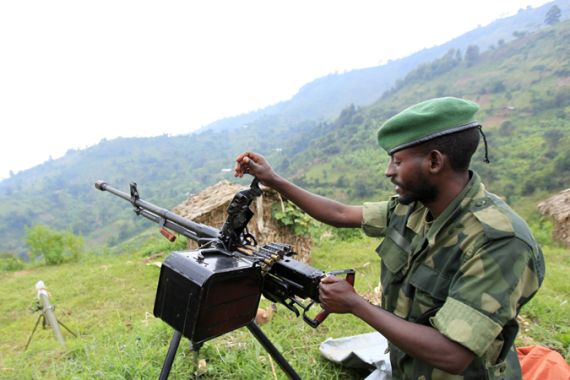Congo wants UN force to ‘neutralise’ rebels
Foreign minister also seeks sanctions against Rwanda officials accused of backing M23 rebels fighting Kinshasa.

The Democratic Republic of Congo has called for boosting the UN peacekeeping force in the central African country to “neutralise” a rebel group known as M23, and accused neighbouring Rwanda of backing the group.
Raymond Tshibanda N’tunga Mulongo, Congo’s foreign affairs minister, on Friday called on the Security Council to impose sanctions on those named in a UN report in July that accused high-ranking Rwandan officials of helping to create, arm and support the M23 rebel group within the country – as well as the rebel movement’s leaders.
He held a news conference after discussions this week with the Security Council and the panel that wrote the July report.
“We believe that all the consequences must be drawn from the conclusions in the report of the group of experts and that sanctions should eventually be envisaged,” Tshibanda told the news conference at the UN on Saturday.
Mulongo said there was still a “war situation” between the two neighbours over the rebellion even though tensions have eased.
The report accused Rwanda’s Defence Minister James Kaberebe; Chief of Defence Staff Charles Kayonga; and General Jacques Nziza, a military adviser to President Paul Kagame, of being “in constant contact with M23”.
Louise Mushikiwabo, Rwanda’s foreign minister, who has denied the accusations, was also at the UN headquarters this week meeting with the panel and council members to protest the report’s findings.
M23 rebels, who have links to Bosco Ntaganda, a warlord wanted by the International Criminal Court on war crimes charges, have been fighting government soldiers in North Kivu province since April, displacing some 470,000 civilians.
Upsurge in violence
The fighting escalated in Congo’s mineral-rich east when army deserters calling themselves the M23 Movement launched a rebellion to demand better pay, better armaments and amnesty from war crimes.
|
Inside Story – Can military action fix DR Congo’s conflict?
|
Rwanda blames Congo for the upsurge in violence, but Mulongo said the evidence in the panel’s report clearly points to Rwanda’s involvement.
The conflict in the east is a spillover from the 1994 genocide. Hundreds who participated in the mass slaughter escaped into Congo and still fight there. The M23 rebels are an embodiment of a group of Congolese Tutsi set up to fight Rwandan Hutu rebels in Congo.
Mulongo said that all of Congo’s borders are quiet except for the border with Rwanda.
Instead of trying to introduce a second foreign force to help bring peace to the volatile east, he said his government wants the Security Council to beef up the mandate of the 22,000-strong UN peacekeeping force to address the escalating violence.
‘Eradicating negative forces’
Kigali has repeatedly rejected the allegations and accused the UN report’s authors of failing to verify their information or consult Rwandan authorities.
|
“It is important that the mandate of MONUSCO be amended and be strengthened“ – Raymond Tshibanda, |
Major donors the US, Britain, the Netherlands and Germany have all suspended some of their financial aid to Rwanda over its alleged backing of the rebels.
Rwanda has repeatedly backed armed movements in its eastern neighbour during the last two decades, citing a need to tackle Rwandan rebels operating out of Congo’s eastern hills.
Tshibanda also echoed earlier calls by Joseph Kabila, Congo’s president, for a new mandate for the country’s UN peacekeeping mission that would include stamping out the armed groups that have destabilised the east for nearly two decades.
The UN mission, known as MONUSCO, has more than 17,000 troops, but the force is stretched thin across a nation the size of Western Europe and already struggles to fulfill its current mandate of protecting civilians.
“It is important that the mandate of MONUSCO be amended and be strengthened,” the foreign affairs minister told reporters.
“Right now it does not have the mandate of monitoring and protecting the border, it does not have the mandate of neutralising, eradicating the negative forces,” he said.
UN helicopter gunships frequently back up outgunned government forces but even that firepower failed to prevent rebels from taking several towns last month.